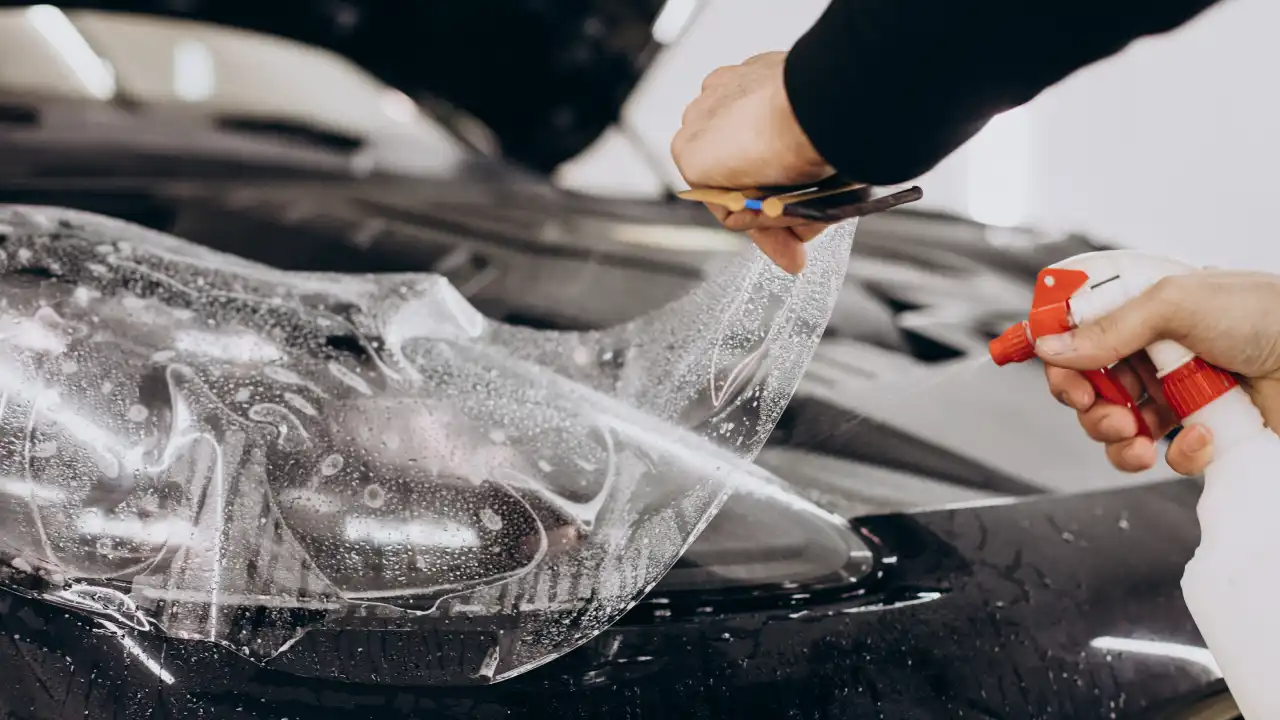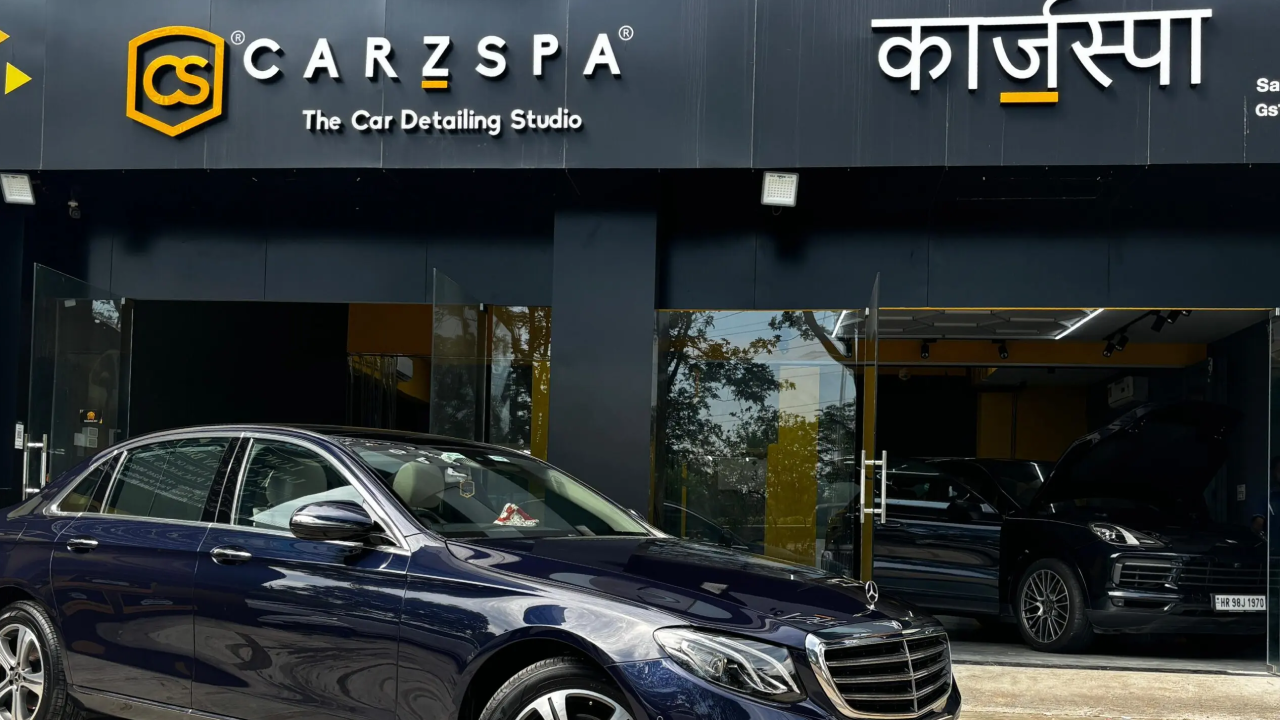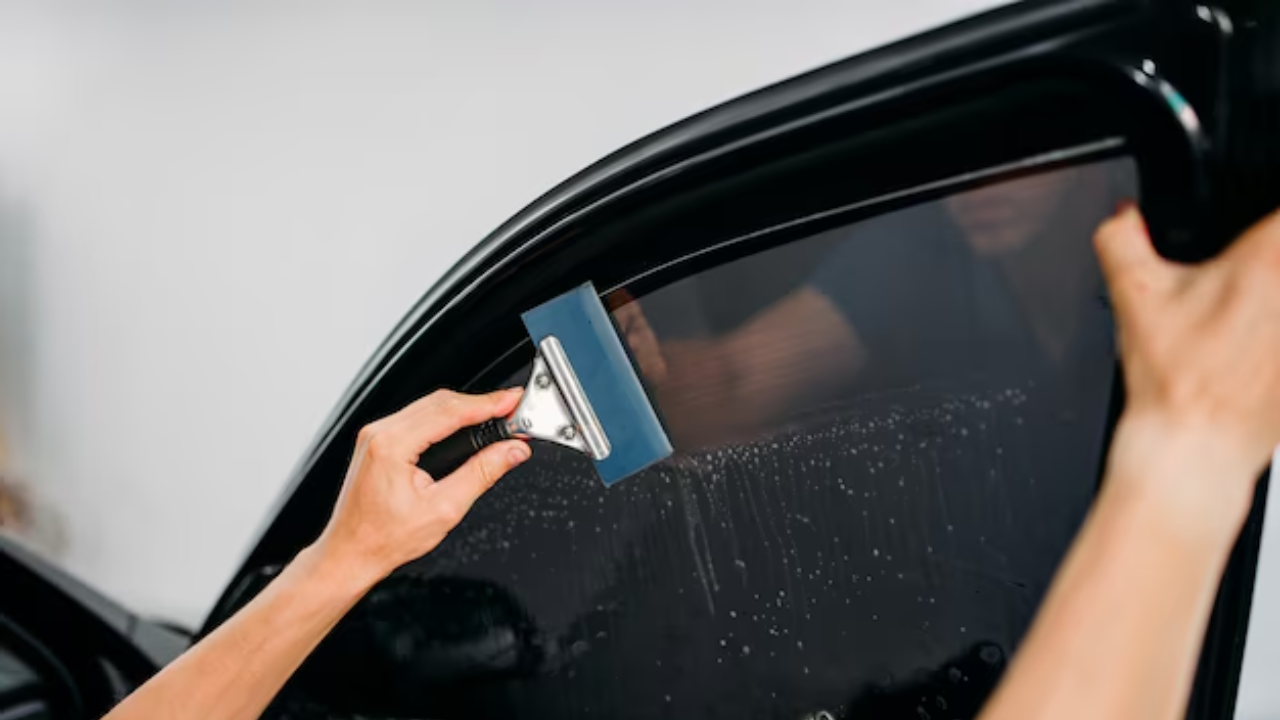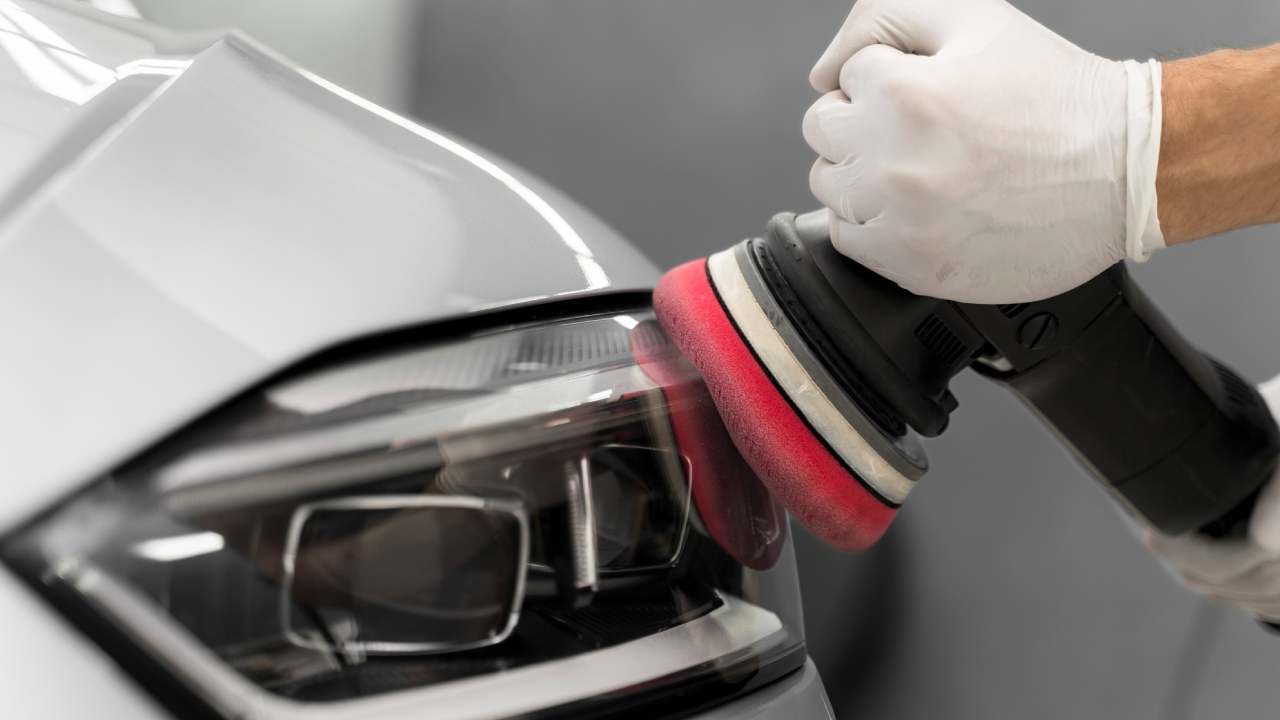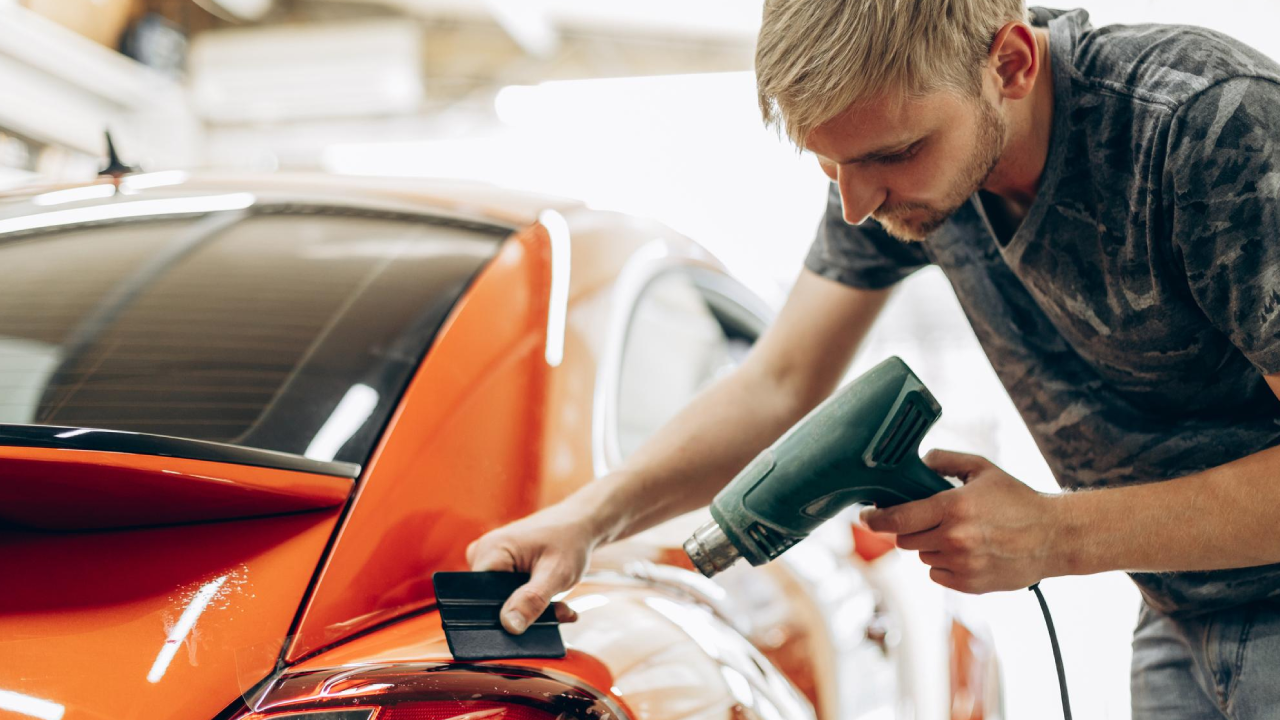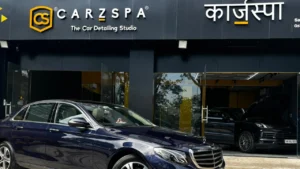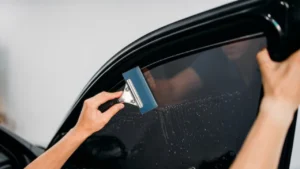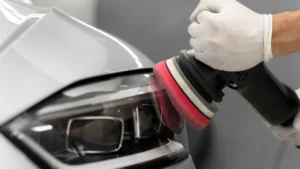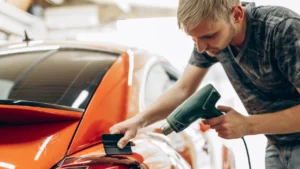If you are a car enthusiast, you know how important it is to protect your car’s paint from scratches, chips and environmental damage. You may already know of PPF coating or paint protection films, which is a protective film made of TPU (thermoplastic polyurethane) that shields your car’s exterior and acts as a barrier against various hazards. But did you know that not all PPF coatings are created equal?
Some are thicker, more durable and more resistant than others. The thickest PPF coating in India is now being offered by Aegis PPF at CarzSpa, the leading car detailing studio in the country. Here, we will tell you everything you need to know about Aegis’ PPF newest range of India’s Thickest PPFs, how it stands out from other PPFs and why it is the best choice for your car.
Table of contents
How thick is PPF coating in general?
One of the most important factors to consider when choosing a PPF coating for your car is its thickness. The thickness of PPF coating determines how well it can protect your car’s paint from various types of damage, such as stone chips, scratches and environmental factors. But how thick is PPF coating in general and how is it measured?
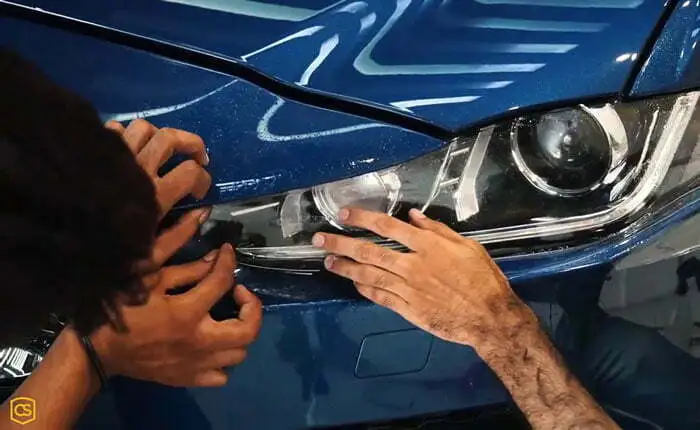
PPF is a layer of transparent material that is installed over your car’s body paint. It is usually made of polyurethane, which is a flexible and durable polymer. PPF coating can vary in thickness depending on the brand, type and quality of the product. Generally, PPF coating ranges from 6 to 12 mils in thickness. A ‘mil’ is a unit of measurement that is equal to 0.001 inch or 25.4 microns.
To give you a better idea of how thick PPF coating is, here are some comparisons with common objects:
- A human hair is about 50 to 100 microns thick, which is equivalent to 2 to 4 mils.
- A sheet of paper is about 100 microns thick, which is equivalent to 4 mils.
- A credit card is about 760 microns thick, which is equivalent to 30 mils.
Generally, PPFs in India range between 140 microns to 230 microns. The thickness of PPF coating is not the only factor that determines its quality and effectiveness. You also need to consider other aspects, such as the type, material, technology and installation of the PPF coating. For example, PPFs have self-healing properties, which means they can repair minor scratches and swirl marks by themselves when exposed to heat. Some PPF coatings also have hydrophobic properties, which means they repel water and dirt, making your car easier to clean. Additionally, some PPF coatings have ceramic components, which enhance their gloss, hardness and resistance.
Meet India's Thickest PPFs
If you are looking for the best paint protection film in India, you need to know about the three main components that make up a PPF coating:
- Top Coat
- Adhesive/Glue
- Thermoplastic Polyurethane (TPU)
These three elements determine the quality, performance and durability of the PPF coating.
The top coat is the outermost layer of the PPF, which provides the gloss, clarity and protection of the film. The top coat also determines the self-healing, anti-yellowing and water-repellency properties of the film.
The adhesive or the glue is the middle layer of the PPF, which bonds the film to the car’s paintwork. This also determines the ease of installation and removal of the film.
The TPU is the innermost layer of the PPF, which provides the flexibility, strength and thickness of the film. The TPU also determines the impact resistance, scratch protection and shape retention of the film.
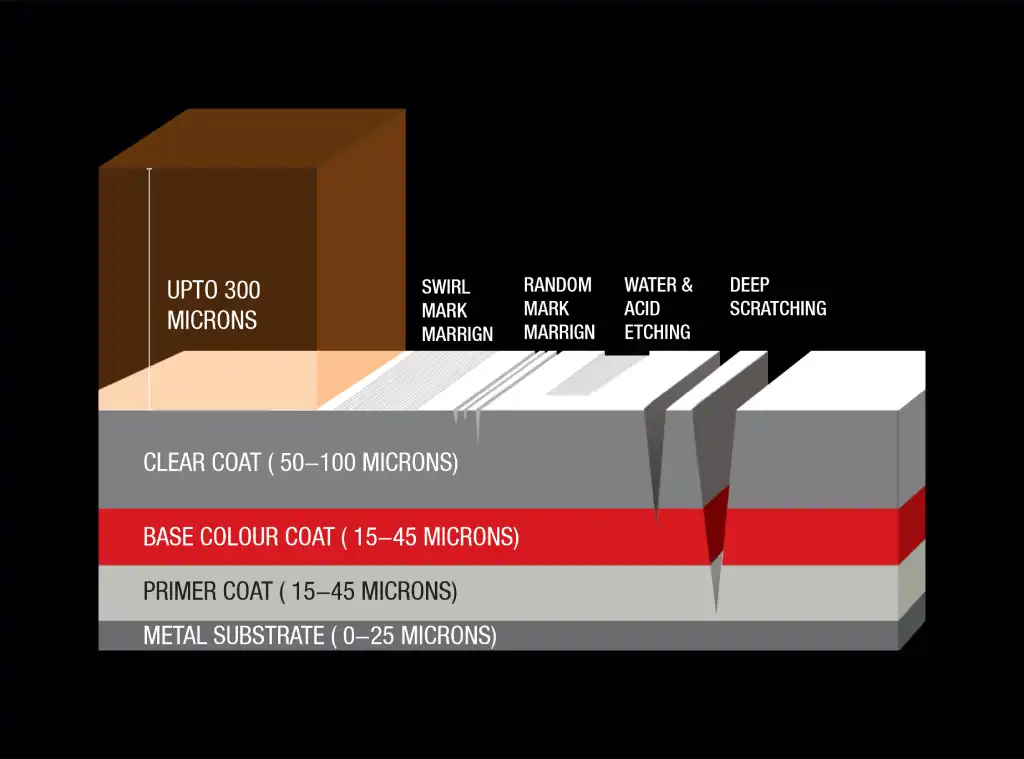
CarzSpa has been able to create India’s thickest PPF coating after intensive research on these three components. CarzSpa innovated the pressure-sensitive adhesive (PSA) earlier, which made the Aegis PPFs the best in the market. With this innovation and its research on increasing the thickness of the TPU in balance with the top coat, CarzSpa has come up with two new variants: Ultra 250 and Eternal 300.
Ultra 250
This is the new and improved Aegis PPF, which ranks among the most advanced and premium PPFs in the market. It has a 250-micron thickness, which is thicker than other 10-year warranty films. It comes with a special UV-resistant top coat, which prevents the film from getting oxidised and has superior self-healing, anti-yellowing and water-repellency properties. It offers an Elongation @ Break of 300% and a Tensile Strength of 30 MPa. This innovative film is extremely durable and comes with a 10-year warranty.
Eternal 300
For those who demand the absolute best protection for their vehicles, CarzSpa presents Eternal 300, the supreme version of Aegis PPF. With an exceptional thickness of 300 microns, Eternal 300 stands as an impregnable barrier against the harshest elements. It inherits all the advanced characteristics of Ultra 250 but the added advantage of unmatched thickness ensures that even the most severe impacts and abrasions will fail to penetrate its protective shield. It is specially designed for off-roaders who need extreme protection. It offers an Elongation @ Break of 300% and a Tensile Strength of 30 MPa. CarzSpa offers a LIFETIME WARRANTY on Eternal 300.
These are the thickest PPF coatings in India and they are only available at CarzSpa, the leading car detailing studio in the country.
Is thicker PPF better?
The thickness of PPF coating can vary from 4 to 9 mils, depending on the product and the brand. But is thicker PPF better for your car?
The answer depends on your preferences and needs, as there are pros and cons of both thick and thin PPF. Thicker PPF coating offers more impact resistance, shock absorption and flexibility. But then thicker paint protection film cost will be higher. Thinner PPF is more discreet, smooth and resistant to yellowing, but it also provides less protection, coverage and durability.
Therefore, you need to balance the factors of appearance, performance and cost when choosing the right thickness of PPF coating for your car. There is no one-size-fits-all solution, as different thicknesses of PPF coating have different strengths and weaknesses.
What is the best PPF thickness?
As we have seen previously, there are advantages and challenges of different thicknesses of PPF coating. But what is the best PPF thickness for your car? How can you choose the optimal balance between protection and appearance?
The answer is not the same for every car owner, as it depends on various factors, such as your car’s model, colour, condition, usage and environment. For example, if you have a base variant car which you use within the city for a regular commute, you may prefer a basic variant of PPF coating that will protect the paint, but only to an extent.
If you have a luxury car from the higher spectrum, you may opt for the top variant of PPF with a higher thickness that offers more protection and less contrast. If you drive your car frequently on rough roads, you may need a thicker PPF coating that can withstand more impact and damage.
Some concluding thoughts…
Aegis’s PPF coating brings the optimal balance between protection and appearance. It is thicker (actually the thickest in the country now) but doesn’t compromise on its aesthetic features. This new range of Aegis’s PPFs by CarzSpa has enhanced features of self-healing and hydrophobicity, which make it the best PPF coating in the market.
We hope you now understand more about PPF coatings and why you should choose Aegis PPF by CarzSpa for your car’s paint protection. Visit your nearest CarzSpa Detailing Studio with your car to get it protected.
Frequently Asked Questions
1. How thick is PPF material?
PPF material is a thin layer of transparent material that covers your car’s paintwork. PPF material can vary in thickness depending on the product and the brand. Generally, PPF material ranges from 6 to 12 mils in thickness.
2. Which PPF quality is best?
The best PPF quality is determined by the TPU or the thermoplastic polyurethane material that is used to make the PPF film. TPU is a type of plastic that has excellent properties such as gloss, clarity, protection, self-healing, anti-yellowing, water-repellency, impact resistance, scratch protection and film retention. TPU is better than TPH or thermoplastic hybrid material, which is another type of plastic that is used to make PPF film. TPH has lower gloss, clarity, hydrophobicity and anti-yellowing than TPU and it is more prone to cracking and peeling.
3. Which is costly PPF or ceramic?
The cost of PPF or ceramic coating depends on the type, quality and brand of the product, as well as the size, model and condition of your car. Generally, PPF coating is more costly than ceramic coating, as it requires more material and labour to install. However, PPF coating also offers more protection and durability than ceramic coating, which may save you money in the long run.

